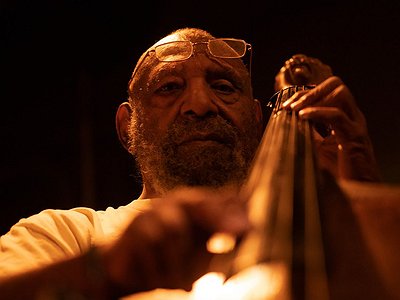Name: Henry Franklin
Nationality: American
Occupation: Bassist, improviser
Current release: Henry Franklin joins Adrian Younge and Ali Shaheed Muhammad for the 14th instalment in the Jazz is Dead series. The album is out September 16th 2022.
If you enjoyed this interview with Henry Franklin and would like to know more, visit his official homepage. He is also on Facebook.
When did you first start getting interested in musical improvisation?
I grew up in a musical family. My dad was a trumpet player so there was music all around me at all times.
Which artists, approaches, albums or performances involving prominent use of improvisation captured your imagination in the beginning?
Paul Chambers was my hero and inspiration.
Focusing on improvisation can be an incisive transition. Aside from musical considerations, there can also be personal motivations for looking for alternatives. Was this the case for you, and if so, in which way?
My first job was to play the bass. Improvision is not my premier job.
My job is to support the band as the bass player. Keeping time and keeping rythym, etc.
What, would you say, are the key ideas behind your approach to improvisation? Do you see yourself as part of a tradition or historic lineage?
I do see myself as part of a lineage.
The way I approach it is to not force my ideas and impulses, but rather allow my ideas to fit in organically and again, to support the music.
What was your own learning curve / creative development like when it comes to improvisation - what were challenges and breakthroughs?
Trial and error
Tell me about your instrument and/or tools, please. How would you describe the relationship with it? What are its most important qualities and how do they influence the musical results and your own performance?
I have a Höfner German bass. It's been with me 40 years.
The string and the set up is very important. And for concerts an excellent engineer.
Can you talk about a work, event or performance in your career that's particularly dear to you? Why does it feel special to you? When, why and how did you start working on it, what were some of the motivations and ideas behind it?
1972 at Monterey jazz festival, playing with Sonny Rollins. And recently working with Jazz Is Dead.
Sonny was the most special saxophone player at the time so it was a big deal to me. With my Jazz is Dead guys, the audiences reaction makes me very happy.
How do you feel your sense of identity influences your collaborations? Do you feel as though you are able to express yourself more fully in solo mode or, conversely, through the interaction with other musicians? Are you “gaining” or “sacrificing” something in a collaboration?
There's a mutual respect for musicians when you share a gig. It also depends on who you are collaborating with. You can gain, lose or both.
Derek Bailey defined improvising as the search for material which is endlessly transformable. Regardless of whether or not you agree with his perspective, what kind of materials have turned to be particularly transformable and stimulating for you?
Improvising is just creating on the spot.
When you're improvising, does it actually feel like you're inventing something on the spot – or are you inventively re-arranging patterns from preparations, practise or previous performances?
Both.
To you, are there rules in improvisation? If so, what kind of rules are these?
No rules.
In a live situation, decisions between creatives often work without words. How does this process work – and how does it change your performance compared to a solo performance?
Everyone feeds off of each other. It’s a very positive thing.
There are many descriptions of the ideal state of mind for being creative. What is it like for you? In which way is it different between your solo work and collaborations?
Being creative is natural for me. It’s my natural state.
How do you see the relationship between sound, space and performance and what are some of your strategies and approaches of working with them?
It's all necessary.
In a way, improvisations remind us of the transitory nature of life. What, do you feel, can music and improvisation express and reveal about life and death?
I can’t answer for death. But music is life.




